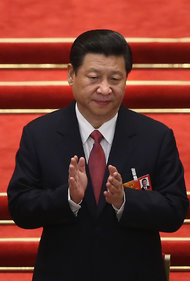China has moved forcefully to secure oil and other commodities in South America over the past decade. Mexico — Latin America’s second-largest economy — has played a different role though, not supplying China but competing with it to export manufactured goods like electronics and clothing to the United States.
President Xi’s visit to Mexico, coming only two months after President Enrique Peña Nieto of Mexico traveled to China, is an effort to recast the relationship under two new leaders.
The trip underscores China’s growing ties in the hemisphere. Before arriving in Mexico, President Xi visited Central America and the Caribbean, further securing his nation’s foothold there. In Trinidad and Tobago, he met with 10 Caribbean leaders and promised $3 billion in loans for projects in the region, according to Bloomberg News. Among the loans was one for $250 million to build a children’s hospital in Trinidad, the Caribbean’s largest energy supplier.
China has given billions in loans and aid to Caribbean nations to build stadiums, roads, ports and tourist resorts, and Mr. Xi’s visit came days after Vice President Joseph R. Biden Jr. met with 15 regional leaders in Trinidad, drawing a sharp contrast about what the two countries had to offer the area’s tiny economies.
Mr. Biden announced no new initiatives, though he spoke about providing help for clean energy research and education and promised to dismantle remaining trade and investment barriers.
On Sunday, Mr. Xi traveled to Costa Rica — which has no diplomatic ties with Taiwan — and promised almost $300 million in loans to finish building a highway. The trip sent a clear message to other Central American countries that by withdrawing their recognition of Taiwan “they could get goodies too,” Kevin P. Gallagher, a professor at Boston University, wrote in an e-mail.
Latin American leaders have long complained that Washington pays too little attention to the rest of the hemisphere’s concerns, and China has begun to take advantage of that perception.
As Latin America and the Caribbean become less dependent on the United States, “they have another economic ally, and that economic ally is a superpower,” said S. Lynne Walker, the director of the China-Americas program at the Institute of the Americas in California.
Matt Ferchen, a scholar at the Carnegie-Tsinghua Center for Global Policy in Beijing, suggested that President Xi’s itinerary may also be intended as a message to the United States. “China wants to remind the U.S. that just as the U.S. has influence in regions close to China, China too has rising influence in the Americas,” he wrote in an e-mail.
Analysts will be watching the trip closely for signs that Mexico and China are taking steps toward changing their frosty relationship.
Mexico’s government would like to narrow its large trade gap with China. Last year, Mexico imported $57 billion in goods from China and sent back only $5.7 billion in products, according to Mexico’s Ministry of Economy.
The two countries announced a series of agreements late Tuesday covering energy, trade and education. “We agree on the importance of balancing our trade and investment relationship,” Mr. Peña Nieto said, noting promises from China to start by accepting more tequila and pork imports.
China could also send a strong message by announcing investments in Mexican manufacturing, experts said, perhaps in the automobile industry.
“At least having the possibility of greater Chinese investment on the table might allow China and Mexico to move beyond their up-till-now quite dysfunctional and competitive relationship,” Mr. Ferchen wrote.
Still, China’s interest in natural resources leaves little doubt that it is looking at future oil deals in Mexico. In a symbolic move, Mexico’s state-owned oil monopoly, Pemex, signed an agreement during Mr. Peña Nieto’s visit to China in April to ship 30,000 barrels a day to Sinopec, a state-owned company there.
Mexico’s Congress is expected to begin debating measures to open the country’s closed oil industry to outside investment later in the year, although it is unclear how far that opening will go.
Still, “in Mexico the goal is to get to the head of the line in energy reform,” Mr. Gallagher wrote.
Despite China’s rising influence in Latin America, the United States has an opportunity to improve relations with the region, he added.
“As excited as Latin American governments are about the new trade and finance from China, they are also getting concerned about an overreliance on commodities and about the heavy toll on the environment Chinese-led growth has exacted,” he said.
The problem is that the United States is not making an attractive enough counteroffer, he said: “We used to be able to dangle access to the biggest economy in the world, but that is no longer enough.”

Karla Zabludovsky contributed reporting from Mexico City.
Article source: http://www.nytimes.com/2013/06/05/world/americas/xi-makes-bridge-building-trip-to-mexico.html?partner=rss&emc=rss
